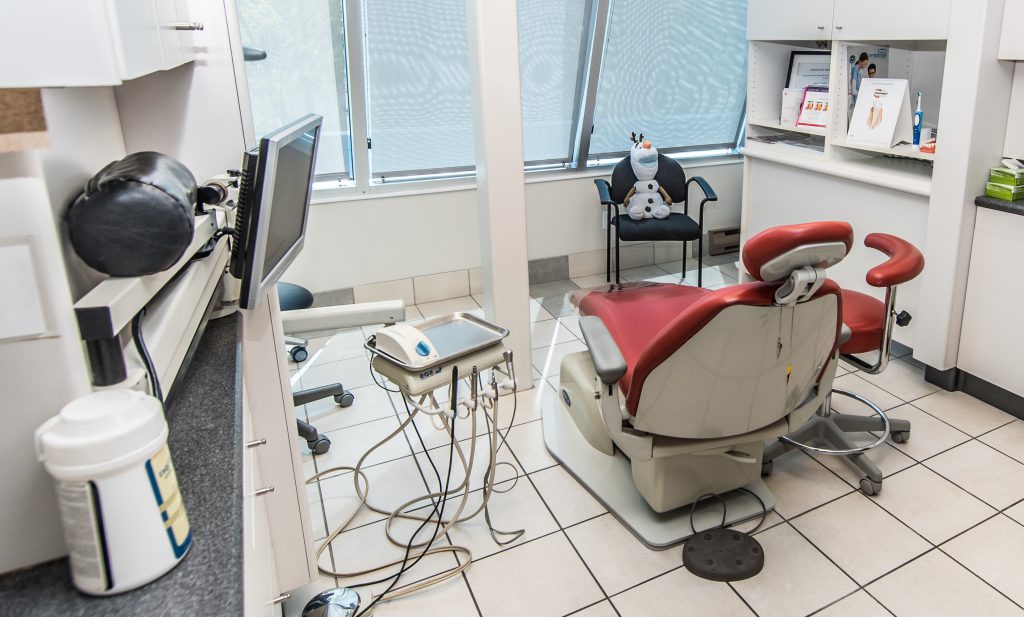Comprehensive Dental Exams
A comprehensive dental exam involves the discussion of what the patient’s treatment needs and expectations are. A thorough and detailed health history is taken in which medications, past and current medical conditions, blood pressure and pulse are noted. It is important to inform your dentist of joint replacements, transplants and certain heart conditions as this can affect the dental treatment needed. Risk factors for cavity formation such as diet, medications and certain medical conditions are also discussed. As well risk, factors for periodontal disease and oral cancer are determined. A head and neck examination is performed to check for enlarged lymph nodes or any suspicious lumps or bumps. Also, the temporomandibular joint is evaluated and any popping, clicking or joint problems are noted. Next, an intraoral soft tissue exam is conducted that carefully examines the lips, cheeks, tongue, hard and soft palate, tonsils and floor of the mouth for any abnormalities.
An important part of the comprehensive exam is the detailed complete dental exam which specifically looks at your periodontal (gum) health. This is done by taking gingival measurements or periodontal probing. A measurement of the space between the top of the gum to where gum attaches to the tooth is charted on different sites for each tooth. Large spaces indicate areas of bone loss and periodontal “gum” disease. Advice is then given on how to clean these deep areas or pockets such that further bone loss can be minimalized or stopped. Often additional deep cleanings or supportive periodontal therapy is recommended and in some cases a referral to a specialist may be needed. Following this exam, every side of each tooth is checked for decay and existing fillings, crowns, implants, root canals, cavities, fractures and tooth problems are charted. Also, dental x-rays may be needed to assess further decay, infections or tooth problems.
After examination and review all the soft tissues, teeth, gums and x-rays an individualized treatment plan is developed that addresses the patient’s specific needs and concerns. It can be a simple as determining the timing of your regular cleaning intervals and oral hygiene instruction to as complex as implants, dentures, extractions and other dental treatment needs. A comprehensive exam provides the tools needed to achieve excellent dental health and lays the foundation for the recall examination or dental “check up”.
Dental Recall Examinations and Preventative Hygiene Services
A dental check up or recall exam usually occurs at the same time as the regularly scheduled cleaning appointments. These check up appointments are individualized based on each patient’s specific needs. It is an opportunity for the dentist to examine the teeth, monitor any changes in cavity formation and gum disease, assess soft tissues and discuss any new dental problems or concerns. In young patient’s the dentist is able to examine the loss of any baby teeth, assess the eruption of any adult permanent teeth, as well as monitor the growth and development of the jaw.
Preventative hygiene services or “dental cleanings” occur at the same appointment as the recall exam. The hygienist cleaning the patient’s teeth will also update the medical history, screen the oral tissues for any abnormalities and then notify the dentist. As well, changes in gum disease, bone levels will be noted. Furthermore, the hygienist will polish the teeth to remove stain, apply fluoride if needed and provide oral hygiene instruction. These are important tools needed in the prevention of dental disease and maintenance of healthy gums and teeth.
Night Guards
Bruxism is the medical term for “teeth grinding or clenching” and can be caused by factors such as stress and anxiety. Bruxism can lead to fractured or cracked teeth, soreness and pain in the jaw, sensitive teeth, loose teeth and headaches. Temporomandibular joint disorders or TMD can also develop due to bruxism. TMD can be very painful and can cause limited opening of your mouth. Night guards are a custom made appliance that is worn either on the top dental or bottom dental arches while sleeping. They can help protect teeth from the ill effects of clenching and grinding and can ease the symptoms of TMD.
Sports guards
Sports guards or mouth guards are custom made appliances worn to protect the teeth when an individual is playing contact sports. They act not protect the teeth but also help prevent injuries that occur when your lower teeth and jaw are heavily contacted against the upper teeth and jaw. Mouth guards are not just for children. Any individuals participating in organized or recreational sports with the possibility of making contact with another individual or hard surface should consider wearing a sports guard.


